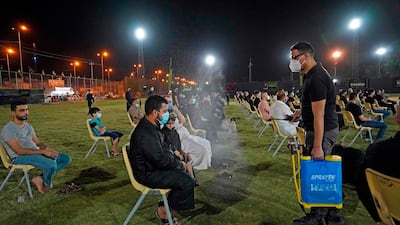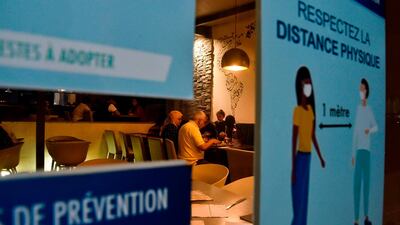Israel's official tally of coronavirus cases passed 100,000 as the government struggles to contain a resurgence in infection rates. Countries around the region have stepped up measures to try to contain new cases as the outbreak continues.
The latest daily tally reported on Friday showed 1,496 new cases, bringing the total to 100,716, the health ministry said.
Israel has reported 809 deaths among its 9 million population.
In May, Israel lifted a nationwide lockdown that had flattened an infection curve, which Prime Minister Benjamin Netanyahu and other officials celebrated as a success. Daily cases that numbered in the hundreds dropped to low double digits.
But a second surge of cases and ensuing restrictions have kept many Israelis out of work. Some restrictions have since been lifted to revive business activity, but unemployment still hovers at 21.5 per cent.
Mr Netanyahu's government has come under fire by Israelis who have taken to the streets in near-daily demonstrations to demand better economic aid.
The protests have also focused on corruption allegations against Mr Netanyahu, which the right-wing premier denies.
Coronavirus around the Middle East










An August 5 poll from the Israel Democracy Institute found that only 25 per cent of Israelis approve of Mr Netanyahu's handling of the pandemic, while about 58 per cent identified with the protests against the government's economic policies.
Neighbouring Lebanon re-entered lockdown on Friday as the country tries to bring down the rapidly increasing number of cases of Covid-19 that have nearly doubled since a catastrophic explosion at the Beirut port.
The spread of COVID-19 is compounding the woes of a country still reeling from the August 4 blast that killed at least 179 people and wounded 6,000, and a financial meltdown that has devastated the economy.
"In this area those who escaped death have relatives who are wounded, there are no homes or cars, frankly we have forgotten corona," said Nabil Nahed, 50, a teacher whose house in the Gemmayzeh area was badly damaged in the blast.
"But we have to take precautions as much as we can because in the last two weeks everyone has been mixing, and corona certainly increased," he said.
Lebanon recorded its highest number of new daily infections on Friday, with 628 new cases and three deaths. The infections have spread since the blast as hospitals were flooded with the casualties, medics say.
"We've gone back to square one," said the caretaker government's health minister on Friday, adding however that the government was better prepared than at the start of the pandemic.
Iman Shankiti, the World Health Organisation representative in Lebanon, said the country was at a dangerous juncture.
"It took us six months since February to reach 5,000 total cases. But unfortunately, during the last two weeks, we have doubled that figure – that's quite worrying," she told Reuters.
Although most cases are expected to be asymptomatic, there was an increase in those needing hospitalisation, she said.
The shutdown, which includes a curfew from 6pm to 6am, allows for clearing rubble, making repairs and giving out aid in neighbourhoods demolished by the explosion. The airport will remain open, with travellers having to take a PCR test before boarding and on arrival.
In the hour following the curfew on Friday, shops were closed and police were seen ushering pedestrians along the seaside corniche. A security source said compliance was good in the Beirut area though less so in northern Lebanon.
Meanwhile, in Tunisia a 5pm to 5am curfew was imposed in two southern towns on Friday as the outbreak re-emerged, the state news agency TAP said.
The North African nation is seeking to counter a second spread of Covid-19 evident since it reopened its borders on June 27 as part of steps to ease a lockdown and revive the economy, particularly the vital tourist industry.
Since then, Tunisia has recorded a major resurgence of infections, exceeding 100 per day over the last two weeks.
The curfew in the towns of Hamma and Hamma Gharbia will remain in effect until August 27.
The government, which has reported 2,543 cases of the virus along with 63 deaths, said it would not be able to shut down the economy again as losses from the lockdown were severe.
The tourism-dependent economy shrank 21.6 per cent in the second quarter of 2020, compared with the same period last year, according to the government statistics agency.

